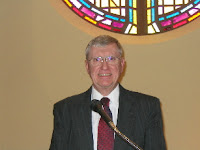“Secular wisdom may lead us to the truth about the
revolution of the planets, but it cannot explain the nature of God, man, sin
and redemption. It cannot lead us to the truth of how we are saved from God’s
wrath, for it refuses to believe that divine wrath is a reality. ‘The message
of the cross is foolishness to those who are perishing’ (Romans 1:18a), said
the apostle Paul, because it does not fit the questions – much less the answers
– of secular wisdom… the message of the cross assumes the terror of the law,
divine wrath toward sinners (and not just their sins), and the need for a
substitutionary sacrifice to assuage divine justice. It assumes the greatest
problem facing humanity is original and actual sin – personal rebellion against
a holy God – not stress, low self-esteem, and a failure to realize one’s
potential.” - Michael Horton in Sola
Scriptura
Sunday, March 20, 2016
Sunday, March 13, 2016
For The Lord's Day
“The way to heaven is ascending; we must be
content to travel uphill, though it be hard and tiresome, and contrary
to the natural bias of our flesh. We should follow Christ; the path he
traveled was the right way to heaven. We should take up our cross and
follow him, in meekness and lowliness of heart, obedience and charity
[love], diligence to do good, and patience under afflictions.” --
from The Christian Pilgrim, Jonathan Edwards
Sunday, March 6, 2016
For The Lord's Day
"There
is only one sense in which it may be said that Jesus “died to sin” and that is
he bore its penalty, since “the wages of sin is death” (Romans 6:23). Having
paid sin’s wage (or borne its penalty) by dying, he has risen to a new life. So
have we, by union with him. We too have died to sin, not in the sense that we
have personally paid its penalty (Christ has done that in our place, instead of
us), but in the sense that we have shared in the benefit of his death. Since
the penalty of sin has been borne, and its debt paid, we are free from the
awful burden of guilt and condemnation. And we have risen with Christ to a new
life, with the sin question finished behind us.” John Stott, The Cross of Christ, p. 270
Sunday, February 28, 2016
For The Lord's Day
“Our substitute, then, who
took our place and dies our death on the cross, was neither Christ alone (since
that would make him a third party thrust in between God and us), nor God alone
(since that would undermine the historical incarnation) but God in Christ, who was truly and fully
both God and man and who on that account was uniquely qualified to represent
both God and man and to mediate between them. If we speak only of Christ
suffering and dying, we overlook the initiative of the Father. If we speak only
of God suffering and dying, we overlook the mediation of the Son.”
~ John Stott, The
Cross of Christ, p. 156.
Sunday, February 21, 2016
For The Lord's Day - Second Sunday in Lent
“Nothing
makes God more supreme and more central in worship than when people are utterly
persuaded that nothing – not money or prestige or leisure or family or job or
health or sports or toys or friends – nothing is going to bring satisfaction to
their sinful, guilty, aching hearts besides God. This conviction breeds a
people who go hard after God on Sunday morning. They are not confused about why
they are in a worship service. They do not view songs and prayers and sermons
as mere traditions or mere duties. They see them as means of getting to God or
God getting to them for more of his fullness – no matter how painful that may
be for sinners in the short run.” ~ John Piper in God’s Passion for
His Glory
Sunday, February 14, 2016
For The Lord's Day
What happened at the cross?
“At the cross in holy love
God through Christ paid the full penalty of our disobedience himself. He bore
the judgment we deserve in order to bring us forgiveness we do not deserve. On
the cross divine mercy and justice were equally expressed and eternally
reconciled. God’s holy love was ‘satisfied.’” John Stott in The Cross of Christ, p. 91
Sunday, February 7, 2016
For The Lord's Day
“Trust
is not a passive state of mind. It is a vigorous act of the soul by which we
choose to lay hold on the promises of God and cling to them despite the
adversity that at times seeks to overwhelm us.” Psalm 56:3 “When I am afraid, I
will trust in you.” Jerry Bridges in Trusting
God
Subscribe to:
Posts (Atom)


